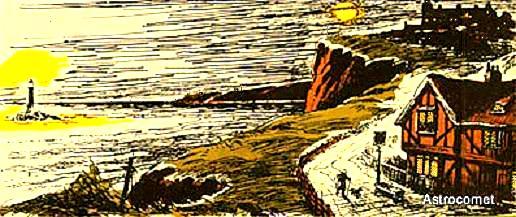======================================================================
BAA electronic bulletin No. 00469 http://www.britastro.org/
======================================================================
This course being run by the Natural History Museum and the Jurassic Coast
World Heritage Team may be of interest to some members.
David Boyd, President
president@britastro.org
****************************************************************
Meteorites formed 4.568 billion years ago in the protoplanetary disk around
the young sun. They are the building blocks of our planets and represent a key
stage in the growth from sub-millimetre fine dust grains in the interstellar
medium to thousands of kilometre sized planets. Thus, the study of meteorites
provide us not only with the formation conditions of our own solar system, but
also with conditions that must be met by other protoplanetary systems, in
order for them to form planets. This knowledge in conjunction with results
from astronomical observations of protoplanetary disks enable us to predict
whether a distant system is capable to form planets in the future or not.
The vast majority of meteorites originate from the asteroid belt. This is a
region between Mars and Jupiter that contains more than a million bodies, the
largest with a diameter of nearly 1000 km. A few meteorites come from Mars and
the Moon. Although all meteorites come from within our solar system, some
contain a small fraction of tiny, so called 'stardust' grains that formed in
other stars or during the explosion of stars in e.g. super nova events.
The course will cover all major aspects of meteorite formation and what we
learn from them about the evolution of our solar system, but also the
formation and evolution of Mars and the Moon. One part will be devoted to our
current knowledge about other protoplanetary disks and exo-planets.
Information about booking on the course can be found here:
http://www.field-studies-council.org/2010/courseinfo.aspx?id=31
The Natural History Museum is joining together with the Field Studies Council,
Jurassic Coast World Heritage Team and Lyme Regis Development Trust to offer a
range of natural science courses operating from the Town in February and March
2010.
http://www.field-studies-council.org/2010/walkingandgeology/jurassiccoast.aspx
This Pilot Project offers a unique programme of field based learning led by
leading specialists in zoology, entomology, botany, mineralogy and
palaeontology to individual students, special interest groups and to further
professional career development.
This is the first time that the Natural History Museum.s Science Directorates
are working in this way and student places will be limited on this pilot for
an innovative, internationally significant educational offer based on the
unique universal value of the Jurassic Coast World Heritage Site. The 2010
pilot project is the next step in establishing the Jurassic Coast Studies
Centre
******************************************************************
======================================================================
BAA electronic bulletins service. E-mail: circadmin@britastro.org
Bulletin transmitted on Thu Jan 28 23:18:56 GMT 2010
(c) 2010 British Astronomical Association http://www.britastro.org/
======================================================================
BAA electronic bulletin No. 00469 http://www.britastro.org/
======================================================================
This course being run by the Natural History Museum and the Jurassic Coast
World Heritage Team may be of interest to some members.
David Boyd, President
president@britastro.org
****************************************************************
Meteorites formed 4.568 billion years ago in the protoplanetary disk around
the young sun. They are the building blocks of our planets and represent a key
stage in the growth from sub-millimetre fine dust grains in the interstellar
medium to thousands of kilometre sized planets. Thus, the study of meteorites
provide us not only with the formation conditions of our own solar system, but
also with conditions that must be met by other protoplanetary systems, in
order for them to form planets. This knowledge in conjunction with results
from astronomical observations of protoplanetary disks enable us to predict
whether a distant system is capable to form planets in the future or not.
The vast majority of meteorites originate from the asteroid belt. This is a
region between Mars and Jupiter that contains more than a million bodies, the
largest with a diameter of nearly 1000 km. A few meteorites come from Mars and
the Moon. Although all meteorites come from within our solar system, some
contain a small fraction of tiny, so called 'stardust' grains that formed in
other stars or during the explosion of stars in e.g. super nova events.
The course will cover all major aspects of meteorite formation and what we
learn from them about the evolution of our solar system, but also the
formation and evolution of Mars and the Moon. One part will be devoted to our
current knowledge about other protoplanetary disks and exo-planets.
Information about booking on the course can be found here:
http://www.field-studies-council.org/2010/courseinfo.aspx?id=31
The Natural History Museum is joining together with the Field Studies Council,
Jurassic Coast World Heritage Team and Lyme Regis Development Trust to offer a
range of natural science courses operating from the Town in February and March
2010.
http://www.field-studies-council.org/2010/walkingandgeology/jurassiccoast.aspx
This Pilot Project offers a unique programme of field based learning led by
leading specialists in zoology, entomology, botany, mineralogy and
palaeontology to individual students, special interest groups and to further
professional career development.
This is the first time that the Natural History Museum.s Science Directorates
are working in this way and student places will be limited on this pilot for
an innovative, internationally significant educational offer based on the
unique universal value of the Jurassic Coast World Heritage Site. The 2010
pilot project is the next step in establishing the Jurassic Coast Studies
Centre
******************************************************************
======================================================================
BAA electronic bulletins service. E-mail: circadmin@britastro.org
Bulletin transmitted on Thu Jan 28 23:18:56 GMT 2010
(c) 2010 British Astronomical Association http://www.britastro.org/
======================================================================
--
Good Clear Skies
--
Astrocomet
--
Colin James Watling
--
Real Astronomer and head of the Comet section for LYRA (Lowestoft and Great Yarmouth Regional Astronomers) also head of K.A.G (Kessingland Astronomy Group) and Navigator (Astrogator) of the Stars (Fieldwork)
--
Web: http://lyra.freewebsites.com/
Good Clear Skies
--
Astrocomet
--
Colin James Watling
--
Real Astronomer and head of the Comet section for LYRA (Lowestoft and Great Yarmouth Regional Astronomers) also head of K.A.G (Kessingland Astronomy Group) and Navigator (Astrogator) of the Stars (Fieldwork)
--
Web: http://lyra.freewebsites.com/


No comments:
Post a Comment